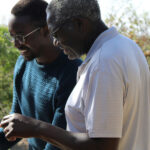“Hi,” says your pastor. “Would you like to pray the intercessory prayer in church on Sunday?” Before you can stop yourself, you’ve agreed. Now, you’re left with questions. What should I pray for? How should I pray? Does my pastor not know that I struggle to pray? What even is an intercessory prayer? If you have asked yourself these questions, then this article is for you: a practical look at praying in public. At intercessory prayer.
Intercessory prayer simply means praying for the needs of others.
Intercessory prayer simply means praying for the needs of others. There are, of course, other kinds of prayer. But most often you’ll be asked to pray for the needs of others. In this article, we will start with some principles for praying in public for the needs of others. In a following article I’ll walk you through a brief example of public prayer, implementing these principles.
My goal isn’t that you copy-and-paste the example, changing only the names and locations to protect the innocent. Nor is this an exhaustive or authoritative guide. No, by these articles I hope to equip you to more comfortably and more helpfully speak to our heavenly Father in public, on behalf of others.
Who Am I, to Pray?
Perhaps as you agreed, you wondered why your pastor asked you. What qualifies you to speak to God? As believers, we do pray. But I suspect, like me—a pastor, I’d add—you wish you spoke to God more often, or enjoyed a deeper relationship with him. Perhaps for some time you’ve struggled to put the words together or find your mind wandering when you put your hands together and close your eyes.
Or maybe you’ve been blessed with a rich prayer life. You often find yourself on your knees, figuratively or even literally, speaking to your good God. But does your success in this area qualify you to speak to God on behalf of the congregation?
So, we ask, who am I to pray?
This isn’t the right question. A better question is: “Who is God to listen?” We must always remember that as we pray, we aren’t speaking into thin air. We are speaking to a living God—a God who cares for us with grace and kindness deeper than we could imagine (Hebrews 4:16).
He is our heavenly Father. Earth is filled with every kind of father, from the kind, present, and loving, to the wicked, abusive, or absent. This may make the metaphor challenging, but God reveals himself to us as a loving father, better than the best earthly father we could imagine. As our loving heavenly Father, he is behind every good gift we receive, and his love is constant and unchanging (James 1:17). When we speak to our heavenly Father, we can have absolute confidence that we will be kindly welcomed. He will never turn us away. He loves us.
We tend to forget this simple truth so easily. So, be reminded: God loves you. He isn’t the loving heavenly Father to some Christians and the “lukewarm heavenly Father” to others. No, he loves all who believe in his Son. Jesus says that the Father loves all who love him (John 16:27). We can approach him boldly because we know that he loves us.
Our God came to us that we might come to him.
He hears our prayers. A heavenly Father behind every good gift, who loves us deeply, would be inaccessible without this final point. Our God is a listening God. Peter puts it so well: “The eyes of the Lord are on the righteous, and his ears are open to their prayer” (1 Peter 3:12). God’s eyes are on you. He knows you personally, and he is always there to listen to your concerns. We can approach our God because of the relationship we have with him, because he knows us, and listens to us.
When we remember that God is our Heavenly Father who loves his people and hears our prayers, we are emboldened to approach him. As sinners, we may not be worthy to approach the heavenly throne, but our God invites us towards him. This is the character of our God: even as exiles and sinners he calls us to seek him and to draw near to him (Jeremiah 29:12-13; James 4:8). This is possible because through Christ’s death our sins are taken from us and Christ’s righteousness given to us (Romans 5:1-2). Our God came to us that we might come to him.
How Should I Pray?
In public intercessory prayer, you are speaking on behalf of the congregation. Your prayers become their prayers. As you speak, your words are repeated in their hearts and minds and addressed to your heavenly Father. This has two implications. First, pray with plural pronouns (we pray, our church, and so on) and second, pray so the congregation can follow.
Personally, I have found it helpful to use some kind of movement. Either moving inwards from world, to country, to local church body; or outwards, in the opposite direction. This makes it easier to take the whole congregation with you as you pray. The second article in this brief series offers an example that movement.
You pray as a representative voice of your local church, before our great and loving God.
Pray respectfully, but comfortably (Matthew 6:7). You are speaking to the king of the universe. So honour God with your speech. Yet God is also your heavenly Father who is listening to you because he cares deeply about the needs you bring to him. He will not turn you away if you stumble over a word. To help you do this, you might want to write out your prayer or bring bullet points with you. If you find this makes it easier for focus on God as you pray, do it. Your prayers will be more focused and heartfelt for it.
How should you pray, then? As a representative voice of your local church before our great and loving God. Your prayer should take the congregation with you as you pray: simply, respectfully, and comfortably speaking to your heavenly Father, lifting up the needs and concerns you have been asked to take to God’s heavenly throne.
What Shall I Pray for?
You have an idea how you might order your prayer. But what should you include? There are general things we can always pray for: growth of the church (Colossians 1:9); ministry (2 Thessalonians 3:1); the sick (James 5:14); the city where God has put you (Jeremiah 29:7). But it is always good to ask if there are any particular needs that should be highlighted. Your pastor may have some prayer points in mind. There may be someone in the church running a prayer list. Ask for these. It is always useful to have specific things in mind as you prepare.
It is also worthwhile checking your calendar for significant events, for example, praying for mothers on Mothers’ Day. Events like these are worth celebrating, and we should rejoice and be thankful in prayer for them. Yet the best prayers for others are deeply considerate of others. Remember that events, of any kind, often combine great celebration and great heartache. Perhaps there is someone in the congregation who wishes they were celebrating Mother’s Day. Rejoice with those who rejoice, weep with those who weep. It is a good opportunity to sensitively acknowledge these kinds of joys and hurts in prayer—but do not single out individuals.
The best prayers for others are deeply considerate of others.
When you pray in public for the needs of others, remember that while you are speaking to God, the congregation is listening and making your prayer their prayer. Every church has broken people. You and I among them. There is real hurt, pain, and need in every congregation, and so often this comes with shame. Be sensitive to this, and don’t embarrass someone by airing the burdens of their soul for all to see. In private, you are afforded much greater opportunity to be specific in your prayers. But in public I encourage you to pray more generally. This particularly holds true in larger congregations, where by being less specific, you may in fact be addressing more people’s needs.
Of course, this is general advice. There are times when it is appropriate to mention people by name. If you are uncertain, err on the side of caution, or perhaps ask the people in question, if you are able.
Remember that our God knows all of our needs even before we ask (Matthew 6:8). This is why you can pray without the pressure to cover every detail or each prayer point that you have received (unless you have specifically been asked to do so). Rather, pray briefly and generally for each point, and choose a few that speak to your heart or that you think are particularly relevant to be praying for as a congregation, and pray for those things in detail.
Intercede with Thankfulness and Praise
It is good to be thankful in prayer. Paul encourages the Colossians to “continue steadfastly in prayer, being watchful in it with thanksgiving” (Colossians 4:2). There is certainly scope for thanksgiving when praying for the needs of others. The same can be said of praising God. It is important, however, to remember the kind of prayer that you are praying. This is a specific kind of prayer: an intercessory prayer.
Remember that the very qualities that we thank and praise our God for, are the reason why we can approach him.
This prayer is for lifting up our needs and the needs of others to God’s throne (Philippians 4:6). While you should certainly give thanks to God where prayers have been answered and praise him for his works, keep your focus on bringing needs to him. The way you do this is by remembering that the very qualities that we thank and praise our God for are the reason why we can approach his throne so boldly. This is the place of praise and thanksgiving in intercessory prayer. “We pray for the needy, knowing that you are a good and powerful God,” or, “we thank you for the faithful preaching of your Word in our church, and we pray that you would continue to be with our ministers.” This is the foundation of our confidence in prayer: the very character of our great God.














